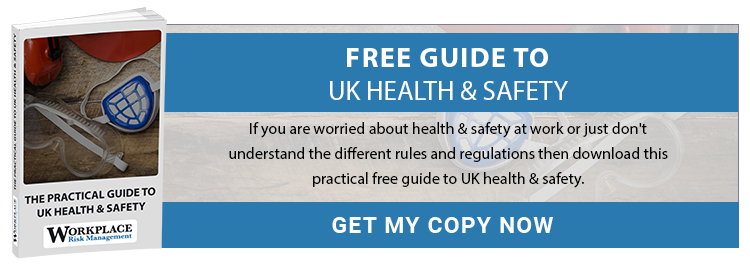
Under the Reporting of Injuries, Diseases and Dangerous Occurrences Regulations 2013 (RIDDOR), certain workplace accidents have to be reported to the Health and Safety Executive (HSE). At Workplace Risk Management we help businesses complete the necessary paperwork for compliance and also analyse the circumstances that led to the occurrence in order to help improve workplace health and safety.
Get my copy of the UK Guide To Health & Safety now!
It is good practice for all businesses to keep accident-reporting records, but not every occurrence requires filing a RIDDOR report.
A RIDDOR Report Is Required In The Following Circumstances:
Workplace accidents leading to:
- The death of an employee, visitor or member of the public
- Serious specified injuries, including:
- Crush injuries to head or torso
- Burns or scalds covering 10% or more of the body, or causing serious injury to lungs, eyes or vital organs
- Head injuries leading to full or partial scalping, loss of consciousness, asphyxia or requiring hospital treatment
- Hypothermia or heat-related injuries from working in an enclosed space (excludes heatstroke and other conditions from working outdoors)
- Amputation of limbs
- Broken bones and fractures (excluding broken fingers or toes)
- Eye injuries likely to lead to sight impairment or loss of sight
- Any injury that requires resuscitation
- Any injury that requires hospitalisation for more than 24 hours
- Any injury that results in more than seven consecutive days incapacitation for a worker
Diseases and long-term health issues linked to workplace hazards:
- Repetitive strain injury in hand or forearm
- Dermatitis
- Vibration syndrome (from operating some types of machinery)
- Asthma and other chronic respiratory conditions
- Tendonitis
- Any cancer linked to carcinogens in the workplace
- Any condition linked to exposure to biological or chemical agents in the workplace (e.g. section, damage to lungs, eyesight etc.)
Certain ‘dangerous occurrences’ – near-miss accidents that could have resulted in serious injury, such as:
- Equipment failure in cranes, load-bearing plant and lifting equipment
- Collision of a vehicle or plant with overhead power lines
- Contact with power lines or electrified rails on a railway
- Serious equipment failure in mines, quarries or offshore oil & gas platforms
- The accidental release of a harmful substance into the environment, which may cause injury or a health issue.
Accidents and occurrences involving gas:
- Where a person has lost consciousness, been hospitalised or died as a result of exposure to gas
- Accidental gas leaks during installation, servicing or modification of gas equipment and appliances
- Any fire or explosion linked to gas or a gas-fuelled appliance
- Incomplete combustion of gas that leads to increased explosion risk, fire hazard or environmental hazard
The report must be filed within 15 days of the accident taking place.
Who Is Covered By RIDDOR?
RIDDOR applies to all types of business, including contractors, partnerships and the self-employed. It is the duty of the workplace Responsible Person (often the Health and Safety Officer) to file a RIDDOR report for each qualifying occurrence.
Some sectors face a higher risk of an accident or occurrence covered by RIDDOR:
- Registered gas engineers
- Chemical handling and processing businesses
- Heavy industry and manufacturing
- Construction
- Power generation
- Oil & Gas
- Mining/Quarrying
- Railway and transport maintenance contractors
Why Choose Workplace Risk Management?
Businesses have a legal responsibility to file accurate RIDDOR reports to the HSE within the required timeframe. This is essential for settling workplace compensation claims, claiming statutory sick pay, or for legal allegations of negligence. We can clarify which incidents are covered by RIDDOR and correlate the information needed to make a full and fast report. For more information, please call 0845 260 4242.


